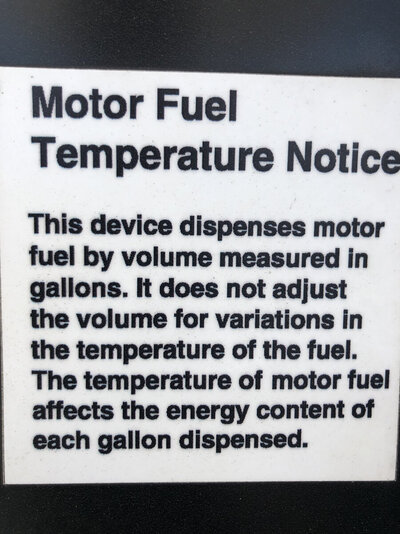-
 Welcome to the Two Wheeled Texans community!
Welcome to the Two Wheeled Texans community!  Feel free to hang out and lurk as long as you like. However, we would like to encourage you to register so that you can join the community and use the numerous features on the site. After registering, don't forget to post up an introduction!
Feel free to hang out and lurk as long as you like. However, we would like to encourage you to register so that you can join the community and use the numerous features on the site. After registering, don't forget to post up an introduction!
You are using an out of date browser. It may not display this or other websites correctly.
You should upgrade or use an alternative browser.
You should upgrade or use an alternative browser.
As seen on gas pump
- Thread starter Fordf350
- Start date
Guessing this is at Costco?
 www.uscourts.gov
www.uscourts.gov
It's telling you not to sue them if you find you are getting less energy content from the fuel than you expected, which is what the plaintiffs alleged in that lawsuit.
In re Motor Fuel Temperature Sales Practices Litigation
Case Summary: 07-md-1840 On June 22, 2007, the Judicial Panel on Multidistrict Litigation issued a transfer order centralizing twelve putative class actions for coordinated pretrial proceedings in the United States District Court for the District of Kansas before the Honorable Kathryn H...
It's telling you not to sue them if you find you are getting less energy content from the fuel than you expected, which is what the plaintiffs alleged in that lawsuit.
- Joined
- Sep 4, 2017
- Messages
- 2,948
- Reaction score
- 3,067
- Location
- Katy, Republic of Texas
- First Name
- Nolan
If you have an above ground tank it is an issue, but below ground has minimal temp differentiation.
I remember reading about this a few years ago and there was minimal difference between fuel @ 60°F and 90°F (my temps may be off, but I do remember it was not really a difference worth worrying about).
I remember reading about this a few years ago and there was minimal difference between fuel @ 60°F and 90°F (my temps may be off, but I do remember it was not really a difference worth worrying about).
X1Glider
0
- Joined
- Jul 7, 2004
- Messages
- 3,876
- Reaction score
- 1,843
- Location
- Tomball, TX
- First Name
- Bob
- Last Name
- Krzeszkiewicz
I don't recall any pump ever stating what the energy content of a motor fuel is in my life. No statement of such has ever been made so there's nothing to dispute.Guessing this is at Costco?
In re Motor Fuel Temperature Sales Practices Litigation
Case Summary: 07-md-1840 On June 22, 2007, the Judicial Panel on Multidistrict Litigation issued a transfer order centralizing twelve putative class actions for coordinated pretrial proceedings in the United States District Court for the District of Kansas before the Honorable Kathryn H...www.uscourts.gov
It's telling you not to sue them if you find you are getting less energy content from the fuel than you expected, which is what the plaintiffs alleged in that lawsuit.
X1Glider
0
- Joined
- Jul 7, 2004
- Messages
- 3,876
- Reaction score
- 1,843
- Location
- Tomball, TX
- First Name
- Bob
- Last Name
- Krzeszkiewicz
Once it gets it's temp raised by the friction of the gears in a fuel pump at high pressure and sits in a fuel rail on top of the engine in a hot engine bay then gets atomized by an injector, it just doesn't matter anymore.If you have an above ground tank it is an issue, but below ground has minimal temp differentiation.
I remember reading about this a few years ago and there was minimal difference between fuel @ 60°F and 90°F (my temps may be off, but I do remember it was not really a difference worth worrying about).
I don't recall any pump ever stating what the energy content of a motor fuel is in my life. No statement of such has ever been made so there's nothing to dispute.
There was a lawsuit, and the plaintiffs lost, as far as I can tell. But in an abundance of caution, I could see Costco putting labels like this on fuel pumps just to avoid someone trying to sue them again for the same reason.
dukey33
0
Isn't the coefficient of expansion for gasoline less than 0.1% per degF?
So a 30degF change (typical morning to afternoon temp swing here) nets a <3% volumetric difference.
My car has an 18.5 gallon tank so at most that makes about a 1/2 gallon difference. Not inconsequential.
But as noted, underground tanks remain at a more stable temp than the air temp.
So a 30degF change (typical morning to afternoon temp swing here) nets a <3% volumetric difference.
My car has an 18.5 gallon tank so at most that makes about a 1/2 gallon difference. Not inconsequential.
But as noted, underground tanks remain at a more stable temp than the air temp.
That sticker is on almost every gas pump I can think of in Texas.
That sticker is on almost every gas pump I can think of in Texas.
Interesting. I guess I don't read gas pumps that much
I have never seen it, but it has to be in response to that Costco lawsuit.
Jeff S
Forum Supporter
This random site says gas is 0.00095 per 1°C or 0.095%
So, at 30F temp swing could be ~17C, or 1.5% more/less volume.
But as @blupupher says, this temp change is very unlikely with in-ground tanks as gas stations, but noticeable in your bike's tank in the Texas sun, or jerry can, etc.
FYI, water is 0.000214, or about 1/4 that of gas.
So, fill up in the cool mornings for the densest gas!
So, at 30F temp swing could be ~17C, or 1.5% more/less volume.
But as @blupupher says, this temp change is very unlikely with in-ground tanks as gas stations, but noticeable in your bike's tank in the Texas sun, or jerry can, etc.
FYI, water is 0.000214, or about 1/4 that of gas.
So, fill up in the cool mornings for the densest gas!
You will get 10 gallons, regardless of what temperature it is.Is this the way I am being told that when I pump 10 gallons I may not be getting 10 gallons.
Only difference is that 10 gallons at higher temps will weigh a hair less.
But will it have a hair less energy? And will it get you a hair less further than the heavy stuff?
Imagine all the wasted resources that team of attorneys used up to file that lawsuit. I wonder how many gallons of fuel they burned up driving back and forth from the courthouse?
Imagine all the wasted resources that team of attorneys used up to file that lawsuit. I wonder how many gallons of fuel they burned up driving back and forth from the courthouse?
tshelfer
0
- Joined
- Sep 4, 2009
- Messages
- 13,478
- Reaction score
- 2,847
- Location
- Centennial, CO
- First Name
- Tim
- Last Name
- Shelfer
But will it have a hair less energy? And will it get you a hair less further than the heavy stuff?
Imagine all the wasted resources that team of attorneys used up to file that lawsuit. I wonder how many gallons of fuel they burned up driving back and forth from the courthouse?
Since when do class action suits have to make an iota of actual sense?
Since when do class action suits have to make an iota of actual sense?
They only have to make cents... preferably with a lot of dollars in front of them!
- Joined
- Sep 4, 2017
- Messages
- 2,948
- Reaction score
- 3,067
- Location
- Katy, Republic of Texas
- First Name
- Nolan
Cents, all the plaintiffs get off it, the lawyers get the rest.They only have to make cents... preferably with a lot of dollars in front of them!
Well in this case, they lost, far as I can tell. So the lawsuit didn't make sense, or cents.
This is why it would make a lot more sense to buy fuel by mass, not by volume. Or even by weight. Formula 1 measures fuel in kg, but oddly enough they have to be able to supply 2 liters of fuel to the stewards at the end of each race for testing if requested, and I guess there's some way they could argue that this isn't fair, they should only have to supply a certain number of grams of fuel, since they were not allocated in liters. Those guys play all sorts of games with temperature and volume and density of air and fuel and all that.
This is why it would make a lot more sense to buy fuel by mass, not by volume. Or even by weight. Formula 1 measures fuel in kg, but oddly enough they have to be able to supply 2 liters of fuel to the stewards at the end of each race for testing if requested, and I guess there's some way they could argue that this isn't fair, they should only have to supply a certain number of grams of fuel, since they were not allocated in liters. Those guys play all sorts of games with temperature and volume and density of air and fuel and all that.
But will it have a hair less energy? And will it get you a hair less further than the heavy stuff?
I have less hair and less hair density but am not sure if that's an applicable coefficient in this dense topic.
@LaserDave , I have the same , maybe a nice simulated hair sticker could fix care this.
Pretty sure Laws of Physics don't apply in county, state, or even federal court.But will it have a hair less energy? And will it get you a hair less further than the heavy stuff?
Imagine all the wasted resources that team of attorneys used up to file that lawsuit. I wonder how many gallons of fuel they burned up driving back and forth from the courthouse?
There is always the People's Court... or Judge Judy. I hear anything goes there.
Pretty sure Laws of Physics don't apply in county, state, or even federal court.
There is always the People's Court... or Judge Judy. I hear anything goes there.
I work for a plaintiff's law firm. I have this, among other things, hung up at my desk.
Attachments
Been that way forever , when you buy a tanker load of gas it is adjusted up when colder then mean temp and down when warmer , you can put more gas in a 9,000 gallon tank when its colder than when it’s hot . And that’s the gas temp , not air temp . Don’t remember the exact numbers but it’s several dollars worth on 9,000 gallons . in a bike gas tank just suck it up and don’t worry their not screwing you unless your buying gas from an overhead tank on a hot day




